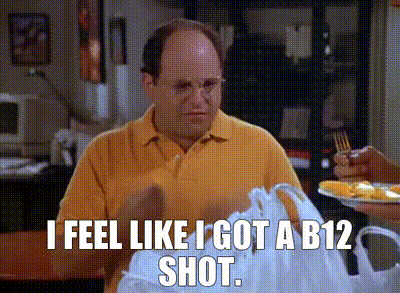Are you getting enough vitamin B? This is a question that many of us don’t know the answer to. Vitamin B is essential for our health, yet most of us aren’t getting enough of it. This can lead to some serious health problems down the road. In this blog post, we will discuss how much vitamin B you need per day, and how to get enough of it!
How much Vitamin B per day?
Most people need at least 25-30 mg of vitamin B per day. However, this does vary depending on your age, gender, and health status. If you are pregnant or breastfeeding, you will need more vitamin B than the average person. The best way to get enough vitamin B is through diet and supplementation.
There are many foods that are rich in vitamin B. Some of the best sources of vitamin B include:
- leafy green vegetables
- legumes
- nuts and seeds
- whole grains
- eggs
- dairy products

Symptoms of Vitamin B deficiency
B1 – Thiamin
A lack of thiamin (vitamin B1) can lead to a number of different health problems. The most common symptom of thiamin deficiency is beriberi, a condition that affects the nervous system and can cause muscle weakness, pain, and paralysis. Other symptoms of thiamin deficiency include fatigue, heart problems, and difficulty breathing. In severe cases, thiamin deficiency can lead to death. Thiamin is found in a variety of foods, including meat, poultry, fish, and whole grains. It is also available in supplement form. People who are at risk for thiamin deficiency include alcoholics, people with kidney disease, and those who have had surgery to remove part of the stomach or intestine.
B2 – Riboflavin
While a lack of riboflavin in your diet isn’t likely to cause serious health problems, it can lead to some uncomfortable symptoms. The most common symptom of riboflavin deficiency is a condition known as ariboflavinosis, which can cause a variety of symptoms, including cracks and sores around the mouth, Glossitis (a painful swelling of the tongue), and eye discomfort. If left untreated, riboflavin deficiency can also lead to anemia. While these symptoms can be annoying, they are usually quickly alleviated by increasing your intake of riboflavin-rich foods or taking supplements. So if you’re experiencing any of these symptoms, there’s no need to worry – simply make some changes to your diet and you’ll soon be feeling back to normal.
B3 – Niacin
A lack of niacin can lead to a number of unpleasant symptoms, including fatigue, indigestion, and skin problems. In severe cases, niacin deficiency can cause schizophrenia and dementia. The body needs niacin to convert food into energy, and a deficiency can lead to fatigue and weakness. Niacin is also essential for proper digestion, and a lack of this vitamin can cause indigestion, diarrhea, and vomiting. Skin problems are another common symptom of niacin deficiency. The skin may become dry and cracked, and the person may develop a condition known as pellagra, which is characterized by rashes and sores. Niacin deficiency can also cause mental problems such as schizophrenia and dementia. In severe cases, it can even be fatal.
B5 – Pantothenic Acid
A deficiency in pantothenic acid can cause a wide range of symptoms, including fatigue, stress, anxiety, depression, irritability, and headaches. In severe cases, pantothenic acid deficiency can lead to cardiac arrest and death. The body needs pantothenic acid to produce energy, and a deficiency can therefore lead to feelings of fatigue. Pantothenic acid is also involved in the production of stress hormones, and a deficiency can cause an increase in stress levels. Anxiety and depression are also common symptoms of pantothenic acid deficiency, as the vitamin is involved in the production of neurotransmitters. Headaches are another symptom of pantothenic acid deficiency, as the vitamin is needed for the proper function of blood vessels. In severe cases, pantothenic acid deficiency can lead to cardiac arrest and death. Therefore, it is important to be aware of the symptoms of pantothenic acid deficiency and to seek medical help if you experience any of them.
B6 – Pyridoxine
Pyridoxine, also known as vitamin B6, is a water-soluble vitamin that plays an important role in many biochemical reactions in the body. It is involved in the metabolism of amino acids and carbohydrates, the synthesis of nucleic acids and neurotransmitters, and the formation of red blood cells. Vitamin B6 deficiency can therefore lead to a wide range of symptoms, including anemia, depression, dermatitis, seizures, and confusion. In severe cases, vitamin B6 deficiency can even lead to coma or death. Thankfully, pyridoxine deficiency is rare in developed countries due to the abundance of foods fortified with this essential nutrient. Nevertheless, it is important to be aware of the symptoms of vitamin B6 deficiency so that treatment can be started as soon as possible.
B7 – Biotin
One of the most important vitamins for human health is biotin, also known as vitamin B7. This water-soluble vitamin plays a crucial role in metabolism, and it is also necessary for the maintenance of healthy skin, hair, and nails. A biotin deficiency can cause a wide range of symptoms, including hair loss, dry skin, and brittle nails. In severe cases, a deficiency can lead to mental health problems such as depression and anxiety. However, biotin deficiencies are relatively rare, and they can usually be effectively treated with supplements. If you think you may be deficient in biotin, it is important to see a doctor for a diagnosis.
B9 – Folate
Although it is commonly known as vitamin B9, folate is actually a water-soluble vitamin that is found in leafy green vegetables, legumes, and nuts. This essential nutrient plays a critical role in the formation of red blood cells, and a deficiency can lead to anemia. Symptoms of a folate deficiency can include fatigue, weakness, pale skin, and shortness of breath. In severe cases, a folate deficiency can also cause neurological problems such as confusion and forgetfulness. A simple blood test can determine whether you are deficient in folate, and supplementation can often correct the problem. However, eating a diet that is rich in folate-containing foods is the best way to prevent a deficiency from occurring in the first place.
B12 – Cobalamin
Vitamin B12, also known as cobalamin, is an essential nutrient that helps to keep the body’s nerve and blood cells healthy. A lack of vitamin B12 can lead to a number of different health problems, including anaemia, fatigue, and memory loss. Vitamin B12 deficiency is relatively rare, but it can occur if a person does not consume enough of the vitamin in their diet. The best sources of vitamin B12 are meat, fish, and dairy products. Vitamin B12 supplements are also available for people who do not get enough of the vitamin from their diet. Early diagnosis and treatment of vitamin B12 deficiency is essential to avoid serious health complications.




